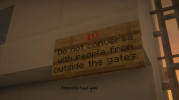One of the first things you’ll notice after walking into Karakura High School & Community College is the sign by the gate reading: “Do not converse with people outside the gates.” This rule is enforced by teachers, employees, professors, and SLT of KHSCC (Karakura High School & Community College). It’s a rule taken almost as seriously as any other. So why do people feel the need to talk and interact with animals outside the gates, unemployed adults outside the gates, and many other people out there in the world? They know that these actions will result in trouble for the future, so why risk it? I’ve chosen to break down as best as I can the reasons for this phenomenon.
First of all, people need support throughout the day. Animals are unable to get into the school during school hours, and many students need mental support from these animals. For this reason, the students who converse with animals, not people, outside the gates are almost all just mentally unwell. The rule also states: “converse with people,” not animals, so I suppose these people aren’t even breaking any rules.
Students who talk to adults outside of the gates are almost always dressed in full black, or talking in Russian to these adults, sometimes even both! Russian is a lesser common language in Karakura, not many speak it. BUt, it appears that those who do are the ones who break this KHS/KC rule.
I’ve stood at the back of the school for a few days, taking notes on the amount of people that this criteria fits. Those who were not speaking Russian nor wearing full black are not counted on the graph below, take a look:
This information is nothing new. If you’ve ever been to the back gates before, you’d know this! Wearing all black is commonly grouped together with people who actively participate in criminal activity. This can be seen through many cartoons, books, and the overall westernised culture of Karakura. The majority of the adults that wander around the outside of the gates for KHS/KC appear there nearly every day, as if they don’t have a job. Many unemployed adults in Karakura partake in criminal activity along with the beloved children of Karakura, so I, along with many others, would not be surprised if these students and adults conversing in Russian are talking about… illegal plans.
To get on the inside of the issue, I’ve discussed it with one person, Hitomi D. Solas. Hitomi is a dedicated High School councilor at KHS/KC with many beliefs about the school and its learning system. I’ve asked her some questions to get a better look on the situation of conversing outside the gates.
Fazel: ”What is your name?”
Hitomi: “Hitomi Dobosz Solas is my full name.”
F: “And you are a councillor at KHS and Community College, yes?”
H: “Correct.”
F: “What are your thoughts on students breaking the: “Do not converse with people from outside the gates” rule?”
H: “I do what needs to be done, I warn them. But, my personal thoughts about the rule will stay unchanged.”
F: “And what are your personal thoughts?”
H: “That rule doesn’t make much sense. Sometimes it does, like when there’s a strange person at the gate. But generally… The rule doesn’t hold much meaning.”
F: “Why, do you think, was the rule implemented, then?”
H: “Possibly to separate people from inside and outside of school? I have no idea.”
F: “What do you think gives students the confidence to break this rule so frequently?”
H: “They are breaking this rule because they want to talk with their suspended or expelled friends. Or just curiosity...?”
F: “What do you think these people are talking about? Is it something to be worried about?”
H: “They can do it literally anywhere. If they do it at the gate, it doesn't change anything. One should not live with the belief that everyone wants to immediately do something wrong, right?”
F: “What are your thoughts that over 70% of students that talk to people outside the gates wear all black clothing, or speak in Russian, a language not so common in Japan?”
H: “Speaking in a different language doesn't mean that someone immediately intends to break the rules.
However, wearing black clothing, known as 'blackouts', is at least suspicious to me, and I keep an eye on such individuals.”
F: “Well, thank you very much for your time, Hitomi.”
H: “Of course!”
It seems to be uncertain amongst everyone why exactly students will choose to converse with those outside
the gates. Perhaps there’s more to it. It should always be remembered that before taking action against someone for something near harmless, we should take into account people’s motives, backgrounds, and other pieces of data that could be influencing this person’s mind or body. Just because someone is talking with someone else who is outside the gates, doesn’t make them a criminal. (they still might be, though, so watch out!)
That’s all,
Fazel Jahii
First of all, people need support throughout the day. Animals are unable to get into the school during school hours, and many students need mental support from these animals. For this reason, the students who converse with animals, not people, outside the gates are almost all just mentally unwell. The rule also states: “converse with people,” not animals, so I suppose these people aren’t even breaking any rules.
Students who talk to adults outside of the gates are almost always dressed in full black, or talking in Russian to these adults, sometimes even both! Russian is a lesser common language in Karakura, not many speak it. BUt, it appears that those who do are the ones who break this KHS/KC rule.
I’ve stood at the back of the school for a few days, taking notes on the amount of people that this criteria fits. Those who were not speaking Russian nor wearing full black are not counted on the graph below, take a look:
This information is nothing new. If you’ve ever been to the back gates before, you’d know this! Wearing all black is commonly grouped together with people who actively participate in criminal activity. This can be seen through many cartoons, books, and the overall westernised culture of Karakura. The majority of the adults that wander around the outside of the gates for KHS/KC appear there nearly every day, as if they don’t have a job. Many unemployed adults in Karakura partake in criminal activity along with the beloved children of Karakura, so I, along with many others, would not be surprised if these students and adults conversing in Russian are talking about… illegal plans.
To get on the inside of the issue, I’ve discussed it with one person, Hitomi D. Solas. Hitomi is a dedicated High School councilor at KHS/KC with many beliefs about the school and its learning system. I’ve asked her some questions to get a better look on the situation of conversing outside the gates.
Fazel: ”What is your name?”
Hitomi: “Hitomi Dobosz Solas is my full name.”
F: “And you are a councillor at KHS and Community College, yes?”
H: “Correct.”
F: “What are your thoughts on students breaking the: “Do not converse with people from outside the gates” rule?”
H: “I do what needs to be done, I warn them. But, my personal thoughts about the rule will stay unchanged.”
F: “And what are your personal thoughts?”
H: “That rule doesn’t make much sense. Sometimes it does, like when there’s a strange person at the gate. But generally… The rule doesn’t hold much meaning.”
F: “Why, do you think, was the rule implemented, then?”
H: “Possibly to separate people from inside and outside of school? I have no idea.”
F: “What do you think gives students the confidence to break this rule so frequently?”
H: “They are breaking this rule because they want to talk with their suspended or expelled friends. Or just curiosity...?”
F: “What do you think these people are talking about? Is it something to be worried about?”
H: “They can do it literally anywhere. If they do it at the gate, it doesn't change anything. One should not live with the belief that everyone wants to immediately do something wrong, right?”
F: “What are your thoughts that over 70% of students that talk to people outside the gates wear all black clothing, or speak in Russian, a language not so common in Japan?”
H: “Speaking in a different language doesn't mean that someone immediately intends to break the rules.
However, wearing black clothing, known as 'blackouts', is at least suspicious to me, and I keep an eye on such individuals.”
F: “Well, thank you very much for your time, Hitomi.”
H: “Of course!”
It seems to be uncertain amongst everyone why exactly students will choose to converse with those outside
the gates. Perhaps there’s more to it. It should always be remembered that before taking action against someone for something near harmless, we should take into account people’s motives, backgrounds, and other pieces of data that could be influencing this person’s mind or body. Just because someone is talking with someone else who is outside the gates, doesn’t make them a criminal. (they still might be, though, so watch out!)
That’s all,
Fazel Jahii




